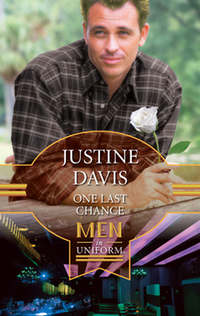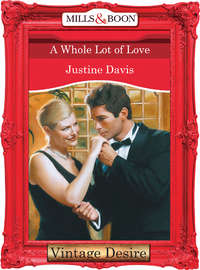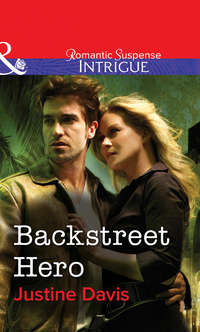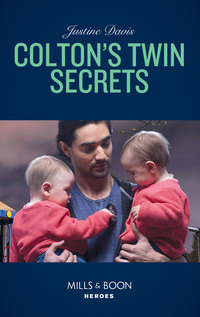
Полная версия
Errant Angel

Errant Angel
Justine Davis

www.millsandboon.co.uk
For the proprietor of Tom’s Garage…
The real angel in my life
Contents
Prologue
Chapter One
Chapter Two
Chapter Three
Chapter Four
Chapter Five
Chapter Six
Chapter Seven
Chapter Eight
Chapter Nine
Chapter Ten
Chapter Eleven
Chapter Twelve
Prologue
“We have no choice.”
“We’re shorthanded.”
“She’s the only one available.”
The words were as gloomy as the clouds that swirled around them while the group sadly agreed. They turned as one to look at the boss, who let out a sigh. That alone told them he’d about reached the end of his rope, a rope pulled tight for too long and far too often by their errant problem child.
“Very well,” he answered at last. “We will try once more.”
“Maybe it will be all right,” someone else put in hopefully. “Somehow, even when she does things...differently, they seem to come out right in the end.”
There was a grumble of voices as they argued over that optimistic interpretation.
“She’s not that bad,” the hopeful one insisted. “You know her heart is true, she just gets...impulsive sometimes. And she was rather young when we recruited her. It’s not her fault that she didn’t have as much life experience as some of the others.”
The rest of the group snorted—as much as they were capable of—in disdain.
“Enough.”
They stopped, and turned their attention once more to the boss.
“Perhaps we’ve been going about this the wrong way,” he went on. “Perhaps in trying to control her, we’ve made a mistake. Humans are unpredictable.”
“Now that’s an understatement,” somebody muttered, earning an uncomfortable moment of the boss’s attention.
“I think,” he continued, “that this time we shall—how do they say it?—let her run.”
“I think they say,” somebody else muttered, “give her enough rope to hang herself.”
“Perhaps,” the boss agreed. “Or perhaps she will prove herself instead.”
“You mean you’re really going to turn her loose? No safeguards, no limitations?”
There was a pause before the answer came. “None except those necessary to protect her.”
A low, collective whistle rose from the group. Only once before had the limitations been suspended, and the result had been...well, unexpected, to say the least. It was the reason they were shorthanded now; they’d lost their very best, but they found it hard to mourn the loss when it had taught them much about human love and joy.
“If we’re going to do it,” the hopeful one said, “we’d better do it now. That child is headed for big trouble.”
“Yes,” the boss said, focusing on the hopeful one. “You’ll be her contact for this mission.”
“Me?”
“Yes. Everyone else seems to expect her to fail. That’s not what we’re about.”
A rustling rose from the group as the rest of them shifted uncomfortably; there was too much truth in the boss’s words.
“All right,” the hopeful one agreed, although they all knew she had little choice in the matter. And it was an honor, of sorts, to be put in charge.
Even if past history showed it might be somewhat like being in charge of an out-of-control circus.
One
What on earth?
Evangeline lifted her head, pressing one hand against her chest. What on earth, she repeated silently, was this odd feeling? This pressure, this constriction, this awful tightness?
In the depths of her mind, a memory stirred, but it was gone before she could put a name to it. The squeezing sensation increased, until she felt as if something vital would burst under the strain. She looked around her, but nothing had changed. She was still alone in the quiet, wet darkness of the little California town a few lonely miles over the hills behind Santa Barbara, on a midnight-deserted street where even the dogs had taken refuge from the rain.
Her fingers curled as she reached toward the golden chain around her neck. But before she could touch the oddly shaped pendant that hung from the chain, the distant mist in her mind parted, and she knew what the feeling was.
Pain. She was feeling pain.
She was so startled that she nearly slipped on a patch of rain-slick pavement. Pain?
“Impossible,” she murmured. She never felt pain. They’d made sure of that. Especially not this kind, the heart-wrenching, gut-level agony of emotions ripped to shreds.
She looked around again, but saw nothing unusual, no explanation for this unexpected sensation. The drugstore she stood in front of was dark. So was the café at the end of the block. The only sign of life at all was a light on upstairs over the auto repair shop across the street.
She tried to focus on the pain, tried to sense the source, but the feeling itself was so fierce, so strong, that it overwhelmed all else.
She reached again for the pendant that hung from the gold chain around her neck. It warmed in her hand, gave off an eerie golden glow, but nothing else happened.
“Great,” she muttered. “The line’s busy.”
She waited, not very patiently; it was hard, in the face of this unrelenting ache, to be stoical. At last the pendant thrummed gently. She nearly snapped the inquiry out.
What took you so long?
The answer formed chidingly in her mind. Tut, tut, my dear, it wasn’t that long.
Easy for you to say. I’ve got a problem here.
So we sensed. Whatever is that odd sensation?
It’s pain, oh mighty one.
Sarcasm does not become you, Evangeline. Besides, that’s impossible. You know you can’t be injured.
Not physical pain. This is different. Emotional.
Oh?
Interest filtered through. The concept of emotional pain, of pure, human heartache, had always fascinated her bosses, since they never experienced it themselves. It had been a very long time since she’d felt that kind of pain, but she remembered, and the memories were more vivid than any recollection of mere physical discomfort.
She tightened her fingers around the pendant as she went on.
I can’t find the source. It’s so overpowering, I can’t even determine a direction.
You’ve always been very sensitive in that area.
Her brow was furrowed now.
I still can’t pin it down. How can I accomplish my mission if I can’t even find my mission?
She could have sworn she heard a sigh. Hopefully not the same way you usually do.
She would have blushed if they hadn’t removed that capability, as well. She knew they were referring to her sometimes reckless approach, and tactics that had caused them much stress on more than one occasion. Then, before she could come up with a suitable—or even unsuitable—comeback, they gave her an answer that puzzled her.
Actually, you shouldn’t be sensing pain from your target. He’s not feeling pain right now, emotional or otherwise. The boy is much too angry.
Then what am I getting? It’s awful. Like someone whose soul is caving in on him.
Him?
She hesitated before going on.
Yes, it is a man. I can tell that much. He must be my mission. He’s in agony.
No. It’s the boy. You know that, we sent you all the information.
I know, it’s just that—
No, Evangeline. Please, for once, tend to business.
But—
No.
It was flat, it was determined, it was an order, and if she hadn’t known it was impossible for them, she would have said they were tired. She gave up for now.
I understand, she sent.
The connection faded. Quickly. Maybe they were tired, she thought. Of her, she added glumly. As if it was her fault people sometimes didn’t react the way she thought they would. Well, if they didn’t like the way she did her job, then they could fire her. After all, she hadn’t asked for this, they’d come to her. Of course, she hadn’t had many options at the time....
Now that the communications link was gone, the pain came rushing back. It seemed to roll over her from her left, and instinctively she looked in that direction. And saw again the single light glowing in the window over the repair garage.
She had taken several steps before the stern order she’d been given brought her up short. She stood there in the dampness, not really feeling the chill. It didn’t take her long—it never did—to rationalize it out. She obviously couldn’t function through this haze of pain, so she had to find the source, didn’t she? Maybe it was something she could fix quickly, and then get on with her work, as ordered.
She started off again, then hesitated again. They had been angry with her, the last time. She’d half expected them to pull her after that one. Not that it had been her fault that dying little girl’s brother had been so awful. And she’d thought the punishment she’d doled out to him moderate enough—why shouldn’t he spend a week hearing in his head what everyone was thinking about him? Besides, it had all come out right in the end.
And she couldn’t bear this. She truly couldn’t. Besides, she hadn’t really said she’d give it up. She’d said only that she understood they wanted her to. She started toward the light.
Three Oaks Garage.
She stood looking up at the faded lettering over the high, roll-up door. The place looked old, as did most of the buildings of this small business district that was centered around the plaza where the three spreading old trees the town had been named for stood. She had no doubts now that she was in the right place; whoever was sending off those waves of anguish was here, close by. No doubt in the room with the light; no one who was feeling like this would be sleeping much.
She tilted her head back, staring up at the rectangle of light. She spared a second to hope that the bosses weren’t monitoring her power usage, then closed her eyes and concentrated.
The darkness behind her eyelids seemed to swirl, then lessen, fading to gray. Slowly the image formed, wavered, then settled.
It was a small room, teetering on the edge of shabby. There were few furnishings; a narrow, neatly made bed against a far wall, a single armchair in front of a small television, on top of which was the only new touch in the room, an inexpensive VCR. Across a side wall was a sink, a small two-burner stove, and a waist-high refrigerator. Next to that was a door that led to a tiny, pocket bathroom.
The carpeting was worn to the threads in spots, and the curtains that hung at the single bank of windows were old and faded by the sun. Yet the room was painfully clean and tidy, with none of the clutter of day-to-day living. No dishes, no glasses, no newspaper casually tossed after reading. The atmosphere of the room was beyond austere, it was almost Spartan.
This visualizing was the hardest of her powers to maintain, and she knew she would be drained if she kept it up much longer. Still she concentrated, raising her fingers to her temples and pressing in a way she’d found helped her sharpen the images.
She sensed him then, sitting at a plain wooden table against the wall beneath the windowsill, and she shifted her concentration. She saw his hands first, strong, work-roughened hands with long, supple-looking fingers curled around the pen he held, an end gripped in each clenched fist. Gripped so tightly, as he stared at the sheet of paper in front of him, that his knuckles were white with tension.
Even as she watched, the plastic of the pen gave under his fierce grasp, snapping in two with a sharp, cracking sound. His head came up then, and he stared at the ruined pen in his hands with eyes that were full of rage, pain and, oddly, resignation. It was a combination so powerful she had to suspend the vision for a moment, for fear the pain would swamp her.
Resignation. The thought came to her suddenly: as if he’d expected nothing less from his own hands than destruction. And for the first time in longer than she could remember, she couldn’t tell if the flash of intuition had come from the outside, as usual, or from within her. It had seemed different, but she hadn’t had to rely on her own instincts for so long, she wasn’t certain she would recognize them anymore.
Just as she wasn’t certain about the odd feeling that flooded her as she looked at the man whose suffering had drawn her here. His hair was dark, long enough to brush over his shoulders, and somewhat shaggy. It gleamed in the light of the single lamp, as meticulously clean as the room he sat in. His shoulders were broad, his waist narrow, and he looked a bit too thin for his size, although there was no lack of muscle in the arms bared below the rolled-up sleeves of a faded chambray work shirt.
She looked again at his face, at the lean, strong jaw, the high, almost aristocratic cheekbones, the straight line of his nose. And she saw the scar, although it was nearly concealed by the thick fall of his hair over his forehead. It was a jagged, wicked mark, running from his right temple up into the hairline above his right eye.
Those eyes. She made herself look at them again, bracing herself for a flood of that incapacitating pain. There was so much darkness around this man that it almost startled her to realize his thickly lashed eyes were green, shadowed now, but a vivid green nevertheless.
The image shifted, wavered, and she knew she was going to lose it. She saw him throw down the broken pieces of the pen, saw them roll across the paper on the desk, coming to a stop below the scrawled salutation that was the only thing written on the page. He reached out and crumpled the paper into a shroud for the destroyed pen, and tossed them both into a metal can on the floor.
And the pain faded away. As if he’d tossed it into the can, as well.
With the loss of the pain, her focus shattered and she was once more out on the rainy street, staring up at the rectangle of light.
And she was exhausted. She always was, when she tried to use that particular talent for too long. She’d heard that some of the others found it easy, and she envied them. Nothing seemed to come easily for her.
But at least she could think now, of something other than that awful pain. She could go on and, as the bosses had said, “tend to business.” Yet she stood still, heedless of the rain that was becoming heavy again.
Who was Linda? That had been the name he’d written at the top of the page. “Dear Linda.” Then he’d stopped. Because the pain had started? Was she a lover, lost to him, this Linda who caused him such agony?
She felt an odd pang at the thought, a faint echo of the ache she’d sensed before. But again, she couldn’t be sure of its origin, if it had indeed been his pain, or her own.
She nearly laughed at herself. Of course it wasn’t her own pain; she never felt pain. But she did get tired, and she was tired now. That had to explain why she was suffering from this odd confusion. A little rest and she’d be fine. She’d better be, she had a lot to do tomorrow. In fact, she had more to do tonight, if the people whose lives she was about to drop into were going to accept the persona she was to present to them. It was time to get started.
But as she turned away, she couldn’t help but look back at the window above her.
It was dark now.
* * *
“I don’t know about you guys, but I think this textbook is as dull as dishwater.”
Twenty fifteen-year-olds gaped at their new teacher, then turned heads to stare at each other in astonishment.
“So,” Evangeline went on, “we’re going to do this a little differently. History from a book is fine, but it’s dead. History was made by living, breathing people, like you, and that’s how it should be taught. So this—” she held up the heavy, ponderous text and grinned “—is history.”
She dropped the book into the cavernous bottom drawer of the desk at the front of the room and slammed the drawer shut. A cheer went up from the room.
“Ms. Law?”
Evangeline nodded at the wide-eyed, concerned-looking girl who sat in the front row. “Yes, Karen?”
“What will we study, then?”
“Who cares?” came a voice from the back of the room.
Jimmy, she thought. Jimmy Sawyer. Her mission.
His slouched, careless posture trumpeted his disinterest, not only in school but in life in general. Thin and gangly, he wore ragged, baggy jeans rolled up above heavy, black combat boots, a T-shirt with the logo of one of the more rancorous rock bands, and a denim jacket with the sleeves cut out. His sandy brown hair hung long over his right ear, but was cut short on the left side, no doubt purposely, to draw attention to the dangling silver skull earring that pierced his left ear.
And anger radiated from him, until Evangeline was amazed that one so young could contain it all. His foster parents must be at their wit’s end with him. But he had every right to be angry at life, she thought. His entire family—parents and a brother and sister—had been wiped out six years before, in the crash of a plane en route to the funeral of his grandfather, a plane he hadn’t been on because he’d been sick and had to stay at home with a neighbor. The report from the bosses had been strictly factual, but the starkness of it only added to the poignancy; because he’d missed one funeral, he’d been the only one left to go to all the others.
Knowing the battle for the boy’s future had begun, she echoed his question. “Who cares?”
“Yeah,” chimed in another student. “At least we don’t have to read that boring stuff anymore.”
The cheering erupted again, this time threatening to get out of hand. Evangeline lifted her eyes and scanned the room, giving each of the rowdy students a full second’s look. They settled down, even as they looked around suspiciously, as if not sure themselves why they were being so cooperative. Even Jimmy straightened a little, although he didn’t look happy about it.
“True, you won’t have to read ‘that boring stuff,’” she explained. “But you will learn. You’ll learn not only what people did, but why. You’ll learn what they felt, what drove them to do what they did.”
Their cheer started to fade a little. She paused, looking out over the class again, stretching her senses, processing the information they brought her.
“How would you feel,” she said casually, “if I told you the government has decided to put a tax on, say, music, but only for kids? Adults won’t have to pay it when they buy a CD or a tape. Just kids. And not because they want the money—but just to show you who’s in charge, who has the authority, just to remind you that you’re only children, and they’re the boss.”
There was an instant of silence, then an outburst of outraged discussion.
“That wouldn’t be fair,” Karen protested from the front row.
“What would you do about it?”
“Fight it!” the girl exclaimed.
“Quit buying tapes,” a boy beside her put in.
“Jimmy?” Evangeline lifted a brow at the boy. “What would you do?”
He seemed surprised to be called on. The bosses had told her that the previous teacher had been glad the boy was usually content to be sullenly silent. The older man had been intimidated by Jimmy’s appearance and his attitude. But surprised or not, the boy had a seditious answer ready on the tip of his tongue.
“Screw ‘em,” he said. “I’d smash their stuff and send it back to them in pieces.”
Cheers and shock seemed to be about evenly spread throughout the room.
“Well, Jimmy,” she said, grinning, “that is exactly what the men of Boston thought the night they dumped the East India Company’s tea into Boston Harbor.”
The boy looked startled, then embarrassedly pleased as cheers rose from his classmates. Evangeline felt a spurt of relief; if the boy could still be pleased at the approval of his peers, then he wasn’t beyond redemption. Maybe, just maybe, this job would go right.
* * *
“She’s kinda cool, really. Nobody’s cut class for a week now.”
Dalton MacKay glanced at the boy, hiding his surprise. Cool was not a word Jimmy often used in reference to school. He straightened up from under the hood of the old truck and looked at the boy, who was fiddling with the chain on his rather distinctive bicycle, a conglomeration of brightly colored parts that Dalton wasn’t sure he wanted to know the origin of.
“Hand me that spark plug socket, will you?” he said. Jimmy hesitated, then reached into the open drawer of the big toolbox. When he handed him the right socket, Dalton gave the boy a smile as he fastened it on the ratchet. “Good. You remembered. So, why is this new teacher cool?”
Jimmy smiled almost shyly at the acknowledgment that he had remembered what Dalton had taught him last weekend. Then he shrugged. “She just is. I mean, instead of makin’ us read that junk, and then just memorize a bunch of dates and stuff that don’t mean anything, she...she makes it seem real. Like it was real people, who were pissed off and did something about it.”
Dalton reached down to yank the next spark plug. “It was real people.”
“I know, but it never seemed like that before. She makes you think about how they felt, you know? Like we talk about something that’s a big deal today, and she gets us all going, and then shows us how what we feel is exactly what they felt, back then.” The boy grimaced. “It’s hard to explain.”
“I’d say you explained it just fine,” Dalton said. “Hand me that box of new plugs, will you?”
Jimmy scooped up the small carton from the neatly organized workbench and handed it to him.
“You’d like her, too,” Jimmy said.
Not likely, Dalton thought. It had been a long time since he’d liked anybody. He only tolerated Jimmy hanging around all the time because he reminded him so much of himself at that age, full of anger and putting up a tough front to hide hurt feelings he wouldn’t ever admit to having. He knew the boy had been orphaned young, had lived in foster home after foster home since, and he couldn’t help the stirring of empathy he felt, despite his vow never to feel anything resembling closeness to anyone again.
Jimmy was looking at him expectantly and, trying to hide the weariness of another near-sleepless night, Dalton asked the question Jimmy was expecting.
“What makes you say that?”
“Well,” Jimmy drawled, not disguising the bantering note in his voice very successfully, “it could be because she’s really awesome-looking. And she’s not married.”
Dalton winced inwardly at the unsubtle words. But he didn’t react outwardly; he remembered enough about being fifteen to know that any reaction would just egg the boy on.
Then, as if puzzled at himself, Jimmy added, “It’s weird, though. I always thought blondes were the best looking, but she’s got this hair that’s like...like those trees up in the mountains, that change color this time of year, you know? Kind of red, brown and gold all mixed up together. And big brown eyes, all soft and gentle, like that fawn that came out of the hills last year.”
Dalton blinked; for Jimmy, the description was tantamount to poetry. As if he realized that, the boy instantly lapsed back into insouciance. “She’s kind of little, but she’s built, too—long legs, nice little butt, great ti—”
“I get the idea,” Dalton interrupted.









